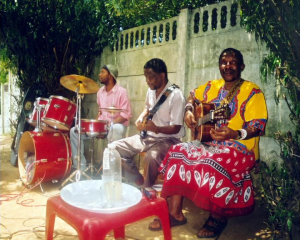Tuning In
Diasporic Contact Zones at the BBC World Service

You are here
- Home
- Core research themes
- Migrating Music
Migrating Music

This project set out to identify the ways in which BBC World Service music broadcasting might be said to constitute a form of 'cultural brokerage'. We wanted to evaluate how far such brokerage has yielded intra-diasporic contact zones (e.g. Iranians communicating with Iranians) and/or cross-diasporic contact zones in music (e.g. communication and contact across linguistic, regional or cultural borders).
Research aims
We aimed to assess, via a series of case studies, the extent and kind of affective, social and political impact of World Service music broadcasting on World Service audiences-cum-publics. In this way, we hoped to weigh the vaunted cosmopolitanism of World Service music broadcasting (historically and in the present). Through case studies of migrating music at key historical conjunctures (WWII, 1980s, 2009) we aimed to reflect on the question of how far such cosmopolitanism might be a product of:
- Instrumental and political goals of the BBC and the British state
- Cosmopolitan culture, openness and mutuality in the World Service
We used our case studies, and theoretical reflection and synthesis to achieve the above aims.
Research questions
The aims of the project are developed through the following research questions:
- Considered on a selective basis, what does World Service music broadcasting consist of?
- What is the musical, discursive and, ultimately, political character of such broadcasting?
- What is the relationship between diasporic musical taste and World Service music broadcasts?
- How far and in what ways is ‘world music’ congruent with contemporary strategy, discourse and priorities at the World Service?
- If ‘migrating music’ is a component of contemporary cosmopolitan societies, has the World Service contributed to this movement of musics and to musical cosmopolitanism more generally? If it has contributed, then how has it done so?
- Which members of diasporic communities do WS music broadcasting, why, and to what effect?
- Have priorities in WS music broadcasting changed historically and if so how?
- How do audiences, or people targeted by the World Service, respond to BBC music broadcasting?
- Does music broadcasting have a future at the World Service?
Theme convenor
Dr Jason Toynbee, The Open University, Faculty of Social Sciences, Department of Sociology, j.a.toynbee@open.ac.uk

